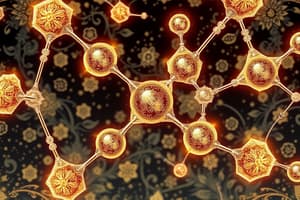Podcast
Questions and Answers
Which type of organic compound contains only carbon atoms in a ring structure?
Which type of organic compound contains only carbon atoms in a ring structure?
- Alkenes
- Cycloalkanes (correct)
- Alkanes
- Carboxylic Acids
What type of compounds contain carbon-carbon double bonds?
What type of compounds contain carbon-carbon double bonds?
- Carboxylic Acids
- Cycloalkanes
- Alkanes
- Alkenes (correct)
Which group of atoms imparts specific properties to organic compounds?
Which group of atoms imparts specific properties to organic compounds?
- Cycloalkanes
- Functional Groups (correct)
- Alkenes
- Alkanes
What type of compounds contain carbon-carbon triple bonds?
What type of compounds contain carbon-carbon triple bonds?
In organic chemistry, what determines the structural formula of organic compounds?
In organic chemistry, what determines the structural formula of organic compounds?
Which type of compounds are straight-chain or branched hydrocarbons?
Which type of compounds are straight-chain or branched hydrocarbons?
What are the physical properties of organic compounds?
What are the physical properties of organic compounds?
What is the process of creating organic compounds through a series of chemical reactions called?
What is the process of creating organic compounds through a series of chemical reactions called?
Which spectroscopy technique is used to study the structure and properties of organic compounds?
Which spectroscopy technique is used to study the structure and properties of organic compounds?
What aspect of organic chemistry deals with the three-dimensional arrangement of atoms in a molecule?
What aspect of organic chemistry deals with the three-dimensional arrangement of atoms in a molecule?
What type of reaction involves the breakdown of organic compounds into simpler starting materials?
What type of reaction involves the breakdown of organic compounds into simpler starting materials?
Which trend in organic chemistry aims to improve the efficiency, sustainability, and scope of research and applications?
Which trend in organic chemistry aims to improve the efficiency, sustainability, and scope of research and applications?
What does IUPAC stand for in the context of naming organic compounds?
What does IUPAC stand for in the context of naming organic compounds?
Which type of reaction occurs at a single molecular level, such as nucleophilic substitution or elimination reactions?
Which type of reaction occurs at a single molecular level, such as nucleophilic substitution or elimination reactions?
What do spectroscopy techniques such as NMR and infrared spectroscopy provide valuable information about?
What do spectroscopy techniques such as NMR and infrared spectroscopy provide valuable information about?
What is the study of conformational changes, stereoisomerism, and stereochemical reactions known as?
What is the study of conformational changes, stereoisomerism, and stereochemical reactions known as?
Study Notes
Introduction to Organic Chemistry
Organic chemistry is the scientific study of the structure, properties, composition, reactions, and preparation of carbon-based compounds, hydrocarbons, and their derivatives. These compounds may contain any number of other elements, including hydrogen, nitrogen, oxygen, the halogens, phosphorus, silicon, and sulfur. Organic chemistry is like building with molecular Legos, as it involves creating and understanding the complex structures of organic molecules.
Structure and Bonding
In organic chemistry, atoms such as carbon, hydrogen, and oxygen form covalent bonds with each other to create a wide variety of molecular structures. The study of structure determines the structural formula of organic compounds, while the study of properties includes physical and chemical properties.
Types of Organic Compounds
Organic chemistry focuses on various types of organic compounds, including:
- Alkanes: Straight-chain or branched hydrocarbons.
- Cycloalkanes: Compounds containing only carbon atoms in a ring structure.
- Functional Groups: Groups of atoms that impart specific properties to organic compounds.
- Alkenes: Compounds containing carbon-carbon double bonds.
- Alkynes: Compounds containing carbon-carbon triple bonds.
- Carboxylic Acids: Compounds containing a carboxylic acid group.
Nomenclature and Properties
Organic compounds have unique nomenclatures and properties, such as:
- Nomenclature: Organic compounds are named according to specific rules, including IUPAC nomenclature.
- Properties: Physical properties include melting point, boiling point, solubility, and dipole moment. Chemical properties include reactivity, stability, and stereochemistry.
Reactions in Organic Chemistry
Organic chemistry involves various types of reactions, including:
- Synthesis: The formation of new organic compounds from simpler starting materials.
- Decomposition: The breakdown of organic compounds into simpler starting materials.
- Single Reaction: A reaction that occurs at a single molecular level, such as nucleophilic substitution or elimination reactions.
- Double Reaction: A reaction that involves two molecules interacting with each other.
Stereochemistry
Stereochemistry is an important aspect of organic chemistry, as it deals with the three-dimensional arrangement of atoms in a molecule. Stereochemistry involves the study of conformational changes, stereoisomerism, and stereochemical reactions.
Spectroscopy
Spectroscopy techniques, such as nuclear magnetic resonance (NMR) and infrared spectroscopy, are used to study the structure and properties of organic compounds. These methods provide valuable information about the molecular structure, bonding, and reactions of organic molecules.
Organic Synthesis
Organic synthesis is the process of creating organic compounds through a series of chemical reactions. This involves designing a multistep synthesis to achieve the desired product, starting from simple building blocks.
Future Trends in Organic Chemistry
Current trends in organic chemistry include:
- Biocatalysis
- Catalysis
- Chemosensors
- Chiral synthesis
- Flow chemistry
- Green chemistry
- Mechanochemistry
- Photoredox catalysis
These trends aim to improve the efficiency, sustainability, and scope of organic chemistry research and applications.
Studying That Suits You
Use AI to generate personalized quizzes and flashcards to suit your learning preferences.
Description
Explore the fundamentals of organic chemistry, including structure and bonding, types of organic compounds, nomenclature and properties, reactions, stereochemistry, spectroscopy, organic synthesis, and future trends in the field. Learn about the building blocks of organic molecules and the methods used to study and create them.




